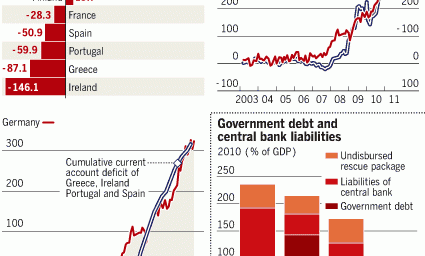Eurozone Headed For A Recession?
Based on the business activity numbers coming out, it’s beginning to look like the entire Eurozone is headed back into recession:
Activity at European businesses hit a near three-year low in May, according to a survey by Markit.
Its index, based on a survey of purchasing managers in the manufacturing and service sector, fell to 45.9 in May, a 35-month low.
In response, the euro fell to $1.2515 against the dollar, a 22-month low.
A summit of European leaders on Wednesday evening failed to boost confidence, as leaders disagreed over how to tackle the crisis.
French President Francois Hollande pushed for pan-European bonds, that would allow struggling nations to raise money at much lower interest rates.
But Germany says it will oppose such a scheme until there is more budget discipline across Europe.
(…)
Markit’s chief economist, Chris Williamson, said his firm’s research indicated that the European downturn “gathered further momentum in May”.
“The survey is broadly consistent with gross domestic product falling by at least 0.5% across the region in the second quarter, as an increasingly steep downturn in the periphery infects both France and Germany,” he said in the report.
Activity at French and German factories fell to the lowest level in almost three years, according to the Markit survey.
“The flash PMI figures for May look horrible and provide a clear warning that eurozone GDP will almost certainly show a contraction in the second quarter after stagnating in the first quarter,” said Martin Van Vliet, from the bank ING.
“It’s not good,” said Peter Dixon from Commerzbank.
“The German ones were particularly disappointing, as we had been expecting some more buoyancy.
“It clearly indicates that the evaporating sentiment that we have seen in recent weeks, as the Greece crisis has intensified, is having a big impact on the economy.”
So it would seem. The question, of course, is what impact a downturn in Europe would have on the U.S. economy. The Eurozone is one of largest trading partners, remember, and a drop in demand could have a serious impact on American companies that rely on overseas revenue. However you paint the picture, though, this is not a good development and would seem to indicate that the rest of this year isn’t going to be as rosy as most of us had hoped.







Here’s a couple of missing letters:
A U S T E R I T Y
Things do continue to trend worse, and yes, as PJ says, it doesn’t hurt to put in context of austerity. Europe tried a path conservatives were pushing here.
Heck, the Ryan-Romney budget is austerity for the poor with tax cuts for the rich.
What a plan for recovery, eh?
“the Ryan-Romney budget is austerity for the poor with tax cuts for the rich.”
But none may call it class warfare.
The beatings will continue until morale improves.
@john personna:
Or the context of “austerity” anyways.
@Stormy Dragon:
It is about baseline expectations, no doubt. But … well let’s just call this related:
Enter, Laffering
As I read that I remembered all the cool kids at OTB who like to talk about how Krugman didn’t have a real Nobel, and he was stoopid anyway.
Even if PK is bête noire for the right, it is getting a bit harder to call him stupid. His analysis and predictions really have held up, especially compared to those of his foes. Thanks to him though, and his argument for full expansionary spending, we never sank as far into true austerity as the right asked. We didn’t, and probably won’t, sink as far as the Ryan-Romney plan asks.
@john personna:
So the failure of America’s half-assed stimulus says nothing about the liklihood of a more expansive stimulus succeeding, but the failure of Europe’s half-assed austerity is enough to condemn calls for actual austerity.
Ireland’s austerity budget – key facts and figures
That was half-assed?
How much further would you have to go to call that real austerity?
@Stormy Dragon:
The stimulus is a failure compared to what? The US economy is growing. Ireland is in a double dip recession, the UK is in a double dip recession, etc. etc.
Yes, the stimulus should have been bigger but don’t be myopic about the results.
@Stormy Dragon: Austerity can never work because the automatic stabilizers will simply push back against the cuts as economic activity declines. Of course the new meme from austerians is to cut into the automatic stabilizers. Then countries can plunge into outright depression much more quickly, and that will be a Triumph for Free Markets.
Or something.
@Doug Mataconis
I doubt an EMU recession will have all that much impact on the U.S. We don’t sell them much as it is so they don’t generate a lot of demand in the U.S. economy. What will probably happen is they’ll double down on ruthlessly suppressing worker quality of living and ramp up covert subsidies to increase their trade surplus with the U.S. and throw more of our citizens out of work. That will hurt.
You’d think at least one thing Greece could do is fix their absolutely insane tax collection. (Taxation basically boils down to “report whatever you feel like reporting.”)